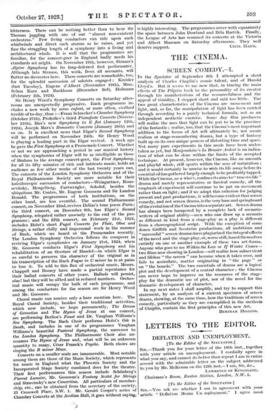effects of The Pilgrim back to the personality of its
creator (February 5th, 1924). through his manifestations of the resourcefulness and the Sir Henry Wood's Symphony Concerts on Saturday after- appeal of timidity, I stopped short and said too little. The noons are unexpectedly progressive. Each programme in- two great characteristics of the Cinema are movement and eludes a new work by some enfant, or more often, vieillard light, and, so far, the manipulation of light has been carried through according to a purely technical formula, not as an (October 27th), Prokofiev's third Pianoforte Concerto (Novem- independent aesthetic exercise. Some day film producers ber 24th), Bax's new Symphony in E flat (January 12th, will realize the uses that light can be put to in the province 1924), Joseph Marx's Romantic Concerto (January 26th) and of the fantastic ; realize, too, that the Cinema's most important so on. It is excellent news that Elgar's Second Symphony addition to the forms of Art will ultimately be, not scenic will be performed on November 24th. Sir Henry Wood realism or stage-remembering drama, but a type of fantasy is playing a leading part in the Elgar revival. A week ago built up on its own unique powers of distorting time and space. he gave the First Symphony at a Promenade Concert. Whether Not many pure experiments in this mode have been under- or not we are approaching a period in our musical history taken as yet, but Moujouskinc's Le Brasier Ardent is an indica- when the symphonies of Elgar will be as intelligible as those tion of what can be done within the limits of the accepted of Brahms to the average concert-goer, the First Symphony, technique. At present, however, the Cinema, like an uncouth and playful whale, still sports within the seas of naturalism ; audience as few other works of the last twenty years can. and it would certainly be unwise to wish its life away before its The concerts of the London Symphony Orchestra and of the essential oil has gathered largely enough to be profitably tapped.
While the Cinema, as a who' c, confines its aims to" true-to-life " drama and merely representative or farcical comedy, all the emphasis of experiment will continue to be put on movement rather than on light ; and if we adopt this criterion for judging present and past productions, it will become evident that screen comedy, and not screen drama, is the very base and springboard of the evolution of the Cinema into a separate art. Screen drama has always been hampered by a complete lack of scenario- Symphony, relegated rather unwisely to the end of the pro- writers of original ability—men who can draw up a scenario gramme ; and the fifth concert, on February 21st, 1924, as different in kind from a stage-play as a play is different from a choreographical script. With the exception of some dozen Griffith and Seestrom productions, all ambitious and "successful " screen dramas have plagiarized the integral effects entirely on one or another example of these two art-forms.
Anyone who goes to see Within the Law or If Winter Comes— as careful to preserve the character of the original as in two films now showing in London—will realize how subservient fails to assimilate, matter originating in "the page " or h h ce draImatic development of character.














































 Previous page
Previous page